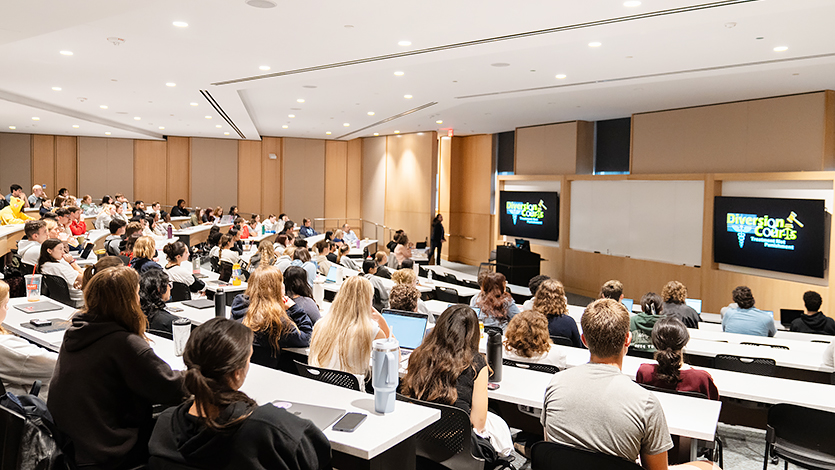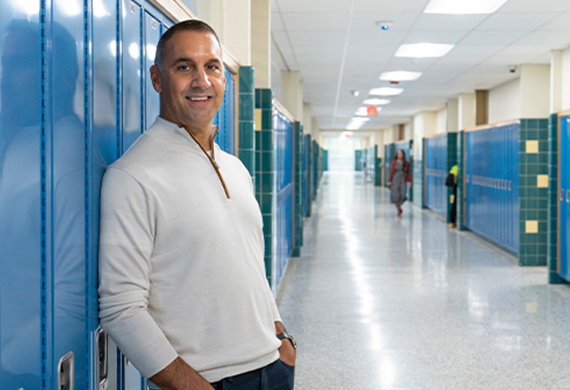Documentary Project Sheds Light on Rehabilitative Programming in Criminal Justice System

December 10, 2024 — A multi-year documentary project offers a glimpse into alternative approaches within the criminal justice system.
The film, called Diversion Courts: Treatment Not Punishment, is part of a unique collaboration between the School of Social and Behavioral Sciences and the School of Communication and the Arts, with funding support from the President's Office.
The film provides an intimate look at rehabilitation-focused court programs called diversion courts, highlighting personal stories dealing with drug treatment, mental health, DWI, and other cases in the courtroom of presiding judge of the Queens Drug Treatment Court Marcia Hirsch.
The documentary has received considerable attention, with screenings at two prominent locations. One took place at the Queens County Criminal Courts Building, followed by remarks from Judge Hirsch. The second screening was held at the Appellate Division of the State Supreme Court in Brooklyn.
Viewers at the Queens County Criminal Courts Building watching Judge Hirsch’s interview in the documentary. Photo by Bryan Terry/Marist College.
A screening also took place on campus at Marist, at which Dr. Julie Raines, Associate Professor of Crime and Justice Studies who advised and oversaw the project, spoke of the importance of highlighting diversion courts and their important role in the criminal justice field.
“These treatment court programs have a dramatic impact on people’s lives, including the many ripple effects in reconnecting with their children, parents, siblings, spouses, and friends,” said Dr. Raines. “This impact inspired me to become involved with these projects, and I’m thrilled to have collaborated with the School of Communication and the Arts to make this important documentary and give students an important education and valuable first-hand field experience.”
The film highlights many aspects of the diversion court system, including a study that shows that people who successfully complete treatment court recidivate at vastly lower rates than their counterparts. Moreover, the film builds on research done by journalist Alisa Roth in her book Insane: America’s Criminal Treatment of Mental Illness.
Click the video to watch the film's trailer.
Stella Shortino '24, a communications graduate, was the on-camera host of the documentary and was closely involved in its production.
“Criminal justice has always been an interest of mine, and I took some criminal and social justice courses during my time at Marist,” said Stella. “Studying law later in life is a real possibility for me, so this project was the perfect convergence of two of my interests.”
Production for the project began in 2019 and was disrupted by the COVID-19 pandemic, so alumni from years past also had a significant role.
Zach Gawron '20, who now works as a video production specialist in Washington, D.C., said the project gave him a unique chance to learn about a subject he would not otherwise have known much about.
“It was a great opportunity to get real world experience working on a production in the field, while simultaneously learning about the criminal justice system,” Zach said. “The topic of diversion courts was new to me, so I truly was getting an education in two things at once.”
“Diversion courts are not traditional courts,” said Judge Hirsch, “By providing treatment instead of incarceration, we give our participants the tools to lead productive, law-abiding lives.”
She added that the film provides a chance to address misconceptions about the criminal justice system, as well as an important learning opportunity.
“By educating college students about these courts, we are expanding their awareness and getting the message out that treatment courts truly save lives,” she said.
Students watch the documentary at the screening in the Dyson Center. Photo by Nelson Echeverria/Marist College.
For Stella, the project went beyond merging her interests, helping her refine her media skills with hands-on, real-world experience.
“Being the on-camera host taught me a lot about myself,” she said. “I was able to explore strategies for line memorization and learn to execute them with confidence and precision in front of the camera. I also recorded all the voiceovers for the documentary and worked in post production.”
Dr. Raines said that following the successful courthouse screenings, future plans for the film include submitting it to various festivals over the course of the next year.
About the transformative experience, Stella said: "Working on this project was one of the highlights of my Marist career."



